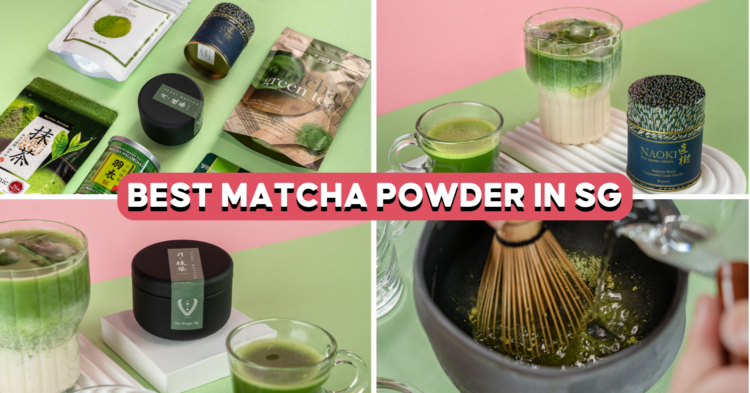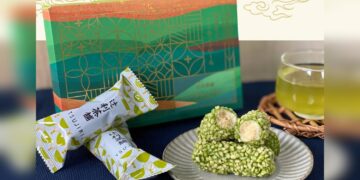Best matcha powder in Singapore
Judging from the number of matcha-centric cafes popping up in Singapore, it goes without saying that Singaporeans love their matcha teas, lattes, and desserts. I’m no different—having substituted much of my morning coffee with matcha lattes, I can’t go a week without having a taste of a vibrant, grassy cup of matcha.
So it only made sense to curate this list of the best matcha powder brands in Singapore. This list features matcha powder from a range of price points, purchased from various supermarkets and artisanal brands.
Popular Matcha Cafe Tsujiri Opens In Tanjong Pagar With 1-For-1 Drinks
The criteria
Before we delve into the rankings, let’s take a closer look at what makes “good” matcha. While matcha powder is made from green tea leaves, special cultivation processes distinguish matcha from regular green tea. Crucial steps such as shading the tea leaves pre-harvest, or grinding the leaves at a slower rate help to produce matcha’s characteristic traits.
For the purpose of this article, I’ve narrowed down three categories that’ll help us decide on the best matcha powder in Singapore.
Appearance: The powder’s colour and texture are the first indicators of its freshness and production quality. A vibrant green hue and smooth texture are ideal. Yellowish or brownish tones and coarse textures, on the other hand, might suggest that the powder was made with filler materials, lower quality leaves, or that it’s gone stale.
Taste: Likewise, the taste of the matcha should be well-balanced and subtly astringent without being overpoweringly bitter. It should also have a smooth mouthfeel free from graininess.
Value: How much does it cost per gram of matcha powder? Does its price point match up to its quality?
Each powder was used to prepare both a tea and a latte to assess how their flavour profiles might vary in different contexts. Additionally, to ensure fairness, we’ve standardised the preparation method across all powders, making sure to use a fixed powder to water ratio, heating the water to the same temperature, as well as using only Oatside Oat milk when making lattes.
7. Ujinotsuyu Matcha Hagoromo
Ujinotsuyu Matcha Hagoromo can be found in little cans at NTUC and Cold Storage for $7, with each can containing 30g of powder. Not much is said on the packaging; the NTUC website describes this powder briefly as a good ingredient for making beverages or baking.
Appearance-wise, it was the dullest and most yellowish out of all the powders, with a distinct coarse texture out of the box. While whisking the powder, I also noticed it had a stale smell.
When mixed with water alone, Hagoromo’s powder yielded an overwhelmingly bitter drink that left an acidic aftertaste. Perhaps adding more water might help with diluting the taste, but I personally disliked the overall flavour. Much of its bitterness was dulled after the addition of milk, but there’s a pronounced powdery texture that made the latte version a little unpleasant to drink too.
At $0.23 per gram though, this is the second cheapest option on the list, and this makes up for its shortcomings somewhat. Perhaps with some honey or sugar, it might taste better.
Appearance: 1/5
Taste: 1/5
Value: 1.5/5
Total: 23.33%
NTUC Fairprice website | Full list of outlets
Cold Storage website | Full list of outlets
Ujinotsuyu Matcha Hagoromo is not halal-certified.
6. Greenpot
Like Ujinotsuyu Matcha Hagoromo, Greenpot can easily be found at local supermarkets. Priced at $9.80 for 50g, the cost per gram is around $0.20, making this the cheapest option on the list.
The colour of Greenpot’s matcha powder was slightly more vibrant than Ujinotsuyu Matcha Hagoromo’s, but it was still observably yellowish and coarse.
Apart from price and appearance, there was not much else that differentiated Greenpot from Ujinotsuyu Matcha Hagoromo. Matcha tea made with Greenpot’s powder was also sharply bitter. Adding milk made it a little better, but once again there was a graininess that irritated the throat.
Because of its lower price tag though, Greenpot edges out Ujinotsuyu Matcha Hagoromo to take sixth place.
Appearance: 1.5/5
Taste: 1/5
Value: 2/5
Total: 30%
NTUC Fairprice website | Full list of outlets
Cold Storage website | Full list of outlets
Greenpot is not halal-certified.
5. Nakayamakichishoen Luxury Matcha
Nakayamakichishoen Luxury Matcha is sold at Don Don Donki for $7.90 in 30g packets. Good things have been said about Don Don Donki’s matcha powders, so I was eager to try this one.
The colour of the powder was a little bit more vibrant than the previous two, and the consistency was looser. However, the matcha tea made with this powder was surprisingly bitter, almost comparable to Greenpot’s. Milk really helped mask the astringent notes here though, creating a relatively smooth latte with a subtle bitter flavour.
I’d recommend making matcha lattes with this powder, but not tea. It also earns some bonus points for being the only halal-certified matcha powder on this list, which places it at fifth place.
Appearance: 2/5
Taste: 1.5/5
Value: 2.5/5
Total: 40%
Don Don Donki website | Full list of outlets
Nakayamakichishoen Luxury Matcha is halal-certified.
4. Uji Matcha
Another option available at Don Don Donki is this sachet of Uji Matcha, which costs $8.90 per 30g sachet. It’s a pretty popular budget pick on Lemon8, and after trying it for myself, I can say that it’s definitely a decent powder.
Compared to previous options, this powder was discernibly greener and less coarse. While whisking it with water, it also produced a savoury, almost brothy aroma.
Taste-wise, it was noticeably more full-bodied and well-balanced than the Nakayamakichishoen Luxury Matcha. Unfortunately, the matcha tea was just a touch too astringent for me, but the latte version was alright, with a nice earthy taste.
Considering that it’s only $0.30 per gram, and that the next best option on this list is a whopping $0.16 more per gram, Don Don Donki’s Uji Matcha is great for those who want to enjoy a decent matcha on a budget.
Appearance: 3/5
Taste: 3/5
Value:3/5
Total: 60%
Don Don Donki website | Full list of outlets
Uji Matcha is not halal-certified.
3. Straits Supply
At $22.80 for 50g of powder, Straits Supply’s matcha powder brings us into more premium territory. They’re not the most well-known brand, but their matcha powder isn’t half bad.
Beautiful bright green colour and fine texture aside, Straits Supply’s powder produced a pleasantly bitter cup of matcha tea with light umami notes. Out of the top three options, Straits Supply’s matcha powder also had the most perceptible taste when mixed with milk.
My only nitpick is that its flavour profile wasn’t as nuanced as the other two more expensive powders. But for more casual drinkers who are just starting to dip their toes into higher quality powders, Straits Supply is a pretty good value-for-money pick, coming in at $0.46 per gram.
Appearance: 4/5
Taste: 3.75/5
Value: 4/5
Total: 78.33%
Straits Supply website
Straits Supply is not halal-certified.
2. Hvala Tsuki No.4
Hvala offers a range of matcha powders with different flavour profiles on their website, but Tsuki No. 4 and Yuki No. 3 are the most affordable options at $20 per 30g tub. While the flavour of Tsuki No. 4 is described as “fresh and vibrant”, Yuki No.3 is characterised as having a creamier taste. I ordered the Tsuki No. 4 to try as I preferred a “brighter” taste, and it did not disappoint.
Just based on the powder’s saturated green colour and loose, silky texture, I could tell that this was going to make a good cup of matcha.
The matcha tea made with this powder had the mildest flavour out of the top three picks, but this isn’t necessarily a downside. True to its description, it had a fresh, almost vegetal flavour profile, with a light astringency that was really enjoyable. I can see this being a great everyday tea that you won’t tire of drinking.
On the other hand, it was a little difficult to taste the matcha at first after oat milk was added, but the flavour came through after a few more sips. The powder did separate rather quickly compared to Strait Supply and Naoki, but a good stir quickly remedied this.
Appearance: 4.5/5
Taste: 4/5
Value: 3.5/5
Total: 80%
Hvala website | Full list of outlets
Hvala is not halal-certified.
1. Naoki Superior Blend
Like Hvala, Naoki has a selection of powders that cater to different tastes. I decided to purchase the Superior Blend as it’s supposedly the most versatile, with a mild, balanced flavour that’s accessible to novice matcha drinkers.
It certainly matched the description—the matcha tea had a more pronounced umami taste than Hvala’s, and was slightly less bitter. The overall flavour can be described as grassy and almost nutty, making this matcha tea my favourite out of all the other powders. Compared to Straits Supply, the taste of matcha was a little less obvious after milk was added, but the overall grassier flavour was what made Naoki the better powder for me.
At this point, it goes without saying that the powder was a rich shade of green, and felt smooth and velvety to the touch.
A 30g canister of Naoki’s Superior Blend powder sets you back $19.99 on Shopee. This works out to $0.67 per gram, which is equivalent to Hvala’s Tsuki No. 4. While both powders are of excellent quality, I preferred Naoki’s stronger flavours, making it my top pick for this list.
Appearance: 4.5/5
Taste: 4.5/5
Value: 3.5/5
Total: 83.33%
Naoki website
Naoki is not halal certified.
Ranking the best matcha powder in Singapore
This list is by no means definitive or comprehensive, but hopefully it’ll help you make a more informed decision when you’re shopping for some matcha powder!
If you can’t get enough of matcha, read our matcha dessert cafe guide for more matcha-related recommendations. Otherwise, check out Tempura Bar for affordable omakase with atas bubble tea.
12 Matcha Dessert Cafes For Matcha Parfaits, Lava Cookies And More
Photos taken by Casandra Nicholas.
This was an independent listicle by Eatbook.sg.
The post 7 Best Matcha Brands In Singapore Ranked, Including Hvala And Naoki appeared first on EatBook.sg – Local Singapore Food Guide And Review Site.






